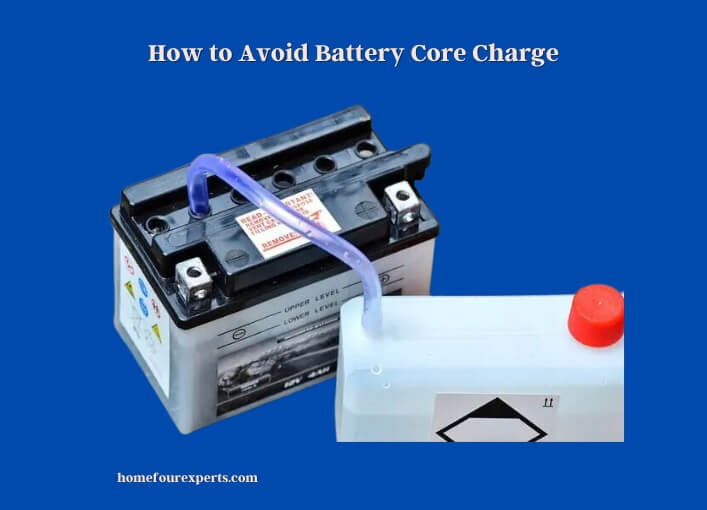You’ll eventually have to replace the battery if you own a car. The core charge is a hidden fee associated with purchasing a new battery, which some individuals are unaware of. At the time of purchasing, they are curious about how to avoid the battery core charge.
Every marine, automotive, solar, and industrial battery for every purpose includes a core charge. You’ll be charged a “ransom” fee if you want to return your old parts to the manufacturer, which is called the Core Charge.

More than 30 states in the USA have passed laws mandating battery core charges at retail locations. However, before depositing the battery, you must know how to calculate the battery to verify that it is time to replace it.
Basically, a core charge is a deposit paid when you buy a battery that is repaid when you exchange it for a used battery. So you might be thinking, can you return any battery for a core charge? Yes, you can either buy it or return it to the store with the battery for a core charge. Let’s dive in to learn more about core charge.
What Does a Core Charge Mean?
There is a “Core Charge,” which is similar to the deposit on a liquor bottle. When you buy a bottle of soda, some countries impose a deposit and refund it when you return the empty bottle. It’s not uncommon for automobile parts to have “core charges,” or core prices, that are similar to a bottle deposit.
How the Core Charge Works
The most common query I get is, do I have to pay a core charge on a battery? Typically, there is no separate fee for the core charge. In some cases, you may be required to pay a “deposit” before returning an item if you find a defect. You forfeit the core charge if you don’t send back the used item, so you’ll have to pay for it now.
For the return and sorting of the pallets, the auto parts shop wraps the pallets and sends them to manufacturers each week. The manufacturer receives the payment from the retailer to cover the expense of either replacing the item or creating a new one. The battery buying price, type, size, and voltage determine the money amount. Like Group 35 Batteries core charge will be different from Group 48 (H6, L3, 66L3) Batteries.
Most importantly, the voltage measurement gives you a clear picture of the battery’s current charging status. So you must know how to test a deep cycle or regular battery with a multimeter, or you can see a car battery voltage chart to figure out the battery’s condition and voltage.
What Is a Battery Core?
The battery core serves as a refundable fee. As a core, it encourages the reuse of goods that can be repaired and encourages recycling. Laws support its adoption in 30 of the 50 states because it is so crucial.
The battery’s core costs anywhere from $5 to $15, depending on the capacity. The terms “battery charge” and “battery core” are frequently used interchangeably, but “battery charge” can also refer to the electrical charge required to start your vehicle. All states have different requirements for adopting these fees; the BCI provides a comprehensive list of regulations for implementing these fees. As a rule, battery core management can’t be done in a single step.
The Core Charge: How to Avoid?
Battery core charge can be avoided if you need new batteries but don’t trade in any cores. So, is there any way to avoid core charges when buying batteries? The following are some additional options to avoid core charge or if you don’t have a battery core to return:
Finding Additional Pieces
To be amazed at how many individuals have outdated batteries or propane tanks or other stuff they forgot about, look around your home or office for any “spare components” you may have. I recently discovered a car battery tucked away behind the dumpster at work, which would have been helpful to me.
Ask Friends For Spare Parts
Asking a friend who has more than a couple of cars can sometimes be beneficial. So, inquire if they have a spare part that you can use instead.
Junkyard Purchase of Alternate
Scrapyards usually don’t sell batteries, but some do so that you can get a replacement there. If it’s something else, you might be able to receive your $15 core chargeback if you buy it for $5. You’ll still lose some, but not all of it.
The Core Charge: How Do You Get Your Money Back?
The exchange is done the same way as a bottle deposit return in most places. It doesn’t matter where or when you bought the battery now, and you’ll get credit and a charge on your receipt if you buy a new battery and return a “dead” battery.
A core fee will be charged if this is your first purchase; you can request a refund at any time after purchasing another battery. If you don’t plan to buy another to complete the cycle, you may be required to submit a receipt.
Note: Keeping receipts is a wise practice, regardless of the situation. To keep track of car-related expenses, choose one of these methods: a three-ring binder, a file folder, or the vehicle maintenance pouch.
Is It Worth to Return a Core?
The major goal of the battery refund program is to encourage recycling and keep harmful chemicals and materials out of landfills and the environment. So those are questioning about how do I get my core chargeback? Now I can think of this as a future investment.
Dedicated battery programs like core fees assist growth and maintaining a healthy battery industry and consumer cycle. Despite our efforts, battery components are damaging to the environment and individuals. Lead-in batteries are hazardous, as are the acids that make them work, so professionals must recycle them safely.
What Happens if No One Claims Core Charges?
It’s important to know that the collected charges don’t go anyplace in most circumstances. The battery core simply moves from one retail store to the next as batteries are sold and collected.
Recycling programs are more effective when promoted and implemented with the government’s backing and the general population. Depending on the program, some core charges return to the part’s original manufacturer, and that way, they can afford to replace the non-returned item.
Regulators are designed and implemented by parties like BCI, and they also push new technology in a continuously changing market according to demand. Core program funds do not go to the non-profit BCI, and their reward is the core program’s success.
FAQs
1. How Is Core Charge Calculated?
The core charge is calculated by subtracting the number of protons from the number of core electrons in the nucleus, and it is always positive in neutral atoms.
2. How Long Does It Take To Refund The Core Charge?
Your refund may take up to ten business days to be finalized after the manufacturer receives your return for inspection and grading and completes the process.
3. Does Walmart Charge a Core Charge for a Battery?
In order to acquire a car battery from Walmart, you must pay a core charge that is refundable if you return the battery to Walmart when it is no longer usable.
4. What Does Deferring a Core Charge Mean?
Diesel Power Products offers a deferred core program that allows you to postpone paying the regular core charge, which will be refunded once your core part is returned.
5. How Do I Get My Core Charge Back?
You can submit the part and a copy of your invoice or packing slip to any Auto Parts shop for your core charge refunds. In contrast, you can return the component to Auto Parts Shop by mailing it back following the instructions on the packing slip.
Conclusion
Some motor parts can be recycled or refurbished for resale purposes. In order to encourage the return of old components, these parts have a core price.
Batteries sold by each store have a small core charge that is entirely refundable when returned. Returning cores can save you money on parts. Without an old battery core, this is how to avoid battery core charge. After following the given tips and information in this article, I hope you can save a few bucks and plan to get a refund on your next purchase.
Read more:
- How Long Does a Wax Pen Battery Take to Charge
- Car Battery Testers and Their Advantages and Disadvantages
About This Writer

Hi, I am responsible for the 'Homeowners Power Solutions' category. My name is Liam Jaxon and a licensed technician with 7 years of experience in vehicle batteries, electrical gadgets, and home appliances. My working experience in different residential & light commercial electrical sectors and the automobile industry helped to acquire vast knowledge in this industry.